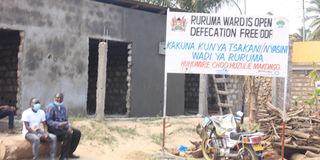Kilifi records win in open defecation battle

A billboard that declares Ruruma ward in Rabai Sub-county, Kilifi as an Open Defecation Free(ODF) zone.
Residents of Kilifi County are embracing the use of toilets.
The county was ranked in the top six among 15 where most people still answer the call of nature in the bush.
Last week, Mwawesa and Ruruma, two of the four wards in Rabai sub-county, were declared open defecation-free areas.
Kambe/Ribe and Rabai/Kisurutini have over 50 per cent and 25 per cent toilet coverage, respectively.
In 2007, Jaribuni village in Kauma sub-county in Ganze was the first village in Kenya to be declared an open defecation-free area.
WASH Alliance Kenya CEO Tobias Ovoko said Kilifi had recorded an improvement in toilet coverage.
“We want to work together with the community, the county government and our partners to ensure that we have Kilifi as an open defecation-free county,” he said.
He spoke during the end of celebrations to mark world sanitation week at Kiwandani village in Kilifi North sub-county.
Mr Ovoko said 280 villages in Kilifi County were triggered to embrace hygiene under the WASH programme that started in October 2020.

Kilifi County Executive officer for health Charles Dadu flanked with health officials and members of the public erecting a billboard that declares Mwawesa ward in Rabai Sub-county as an Open Defecation Free(ODF) zone
Out of that number, 120 were verified while 110 were certified as open defecation-free zones.
“This is a good gesture and a big milestone for the people of Kilifi in maintaining sanitation and hygiene because they have managed to improve within a short period,” he said.
Besides building toilets, he said, the programmes also aim to prevent the spread of the coronavirus by encouraging the public to wash hands.
The status of hygiene and sanitation in Kilifi is unsatisfactory, said county head of preventive promotion Ummi Buni.
“We are not doing well in Kilifi in matters of sanitation and hygiene. This is an issue of concern to us,” she said.
The community, she said, mostly builds toilets just to show public health officers that they have complied with their orders and a majority of people still relieve themselves in the bush though toilets are available.
However, Dr Buni said washing hands to prevent the Covid-19 infections had reduced cases of cholera and diarrhoea in the county.
She said the county government has embarked on a programme to ensure all markets have public toilets.

Purity Kahindi, a community health worker from Kiwandani village in the outskirts of Kilifi North sub-county demonstrates how to construct homemade hand washing equipment.
Sanitation officer Amos Ndenge said only 20 per cent of Kilifi’s population is not using toilets and washing hands.
“In our roadmap, we expect that by 2024, Kilifi County will be declared open defecation-free,” he said.
Mr Ndenge said a majority of Kilifi sub-counties are recording an increase of between 70 per cent and 80 per cent in toilet coverage and handwashing.
But Malindi and Magarini sub-counties are lagging.
This is after the county introduced a community-led total sanitation programme to sensitise people through community health workers and volunteers on the importance of embracing hygiene.
“This approach has given the community a role to take the lead in issues of sanitation, unlike before when public health officers used to move around ordering people to build houses. Everybody has a responsibility to maintain hygiene,” he said.
He said the programme had helped address major cultural impediments that blocked a majority of families from building toilets. Among them was the myth that a father-in-law cannot share a toilet with her daughter-in-law.
Community health volunteer Kanze Thoya, from Bwagamoyo in Mwawesa ward, said it was not easy to convince women to use toilets.
“Women were reluctant to build toilets. They brushed us off and told us that they could not mix their stool with that of their father-in-laws,” she said.
But she said efforts by volunteers and the public gradually paid off.





